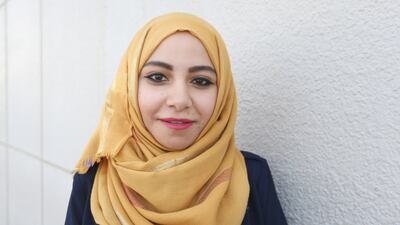ABU DHABI // For Ala Hashem, detecting particles in nuclear physics has almost become a hobby.
After a two-month training stint at the European Organisation for Nuclear Research (Cern) in Switzerland last summer, the Egyptian graduate from the UAE University in Al Ain is one step closer to her goal of working in high-energy physics.
“Attending the training was a great opportunity to learn more from really talented scientists,” Ms Hashem, 24, said. “I really enjoyed it as I got to meet Nobel prize winners and people with extensive experience in the field.”
She worked with a group of foreign students using highly sophisticated technology, including a particle detector called a Compact Muon Solenoid.
“We built resistance plate chambers to detect neon particles from the Sun,” she said. “This was done to validate the experiment.
“Scientists basically look for new particles to understand which are responsible for what, such as mass, for example.”
The aim of the exercise was to find out whether the practical work matched the theory.
“Most physicists do theoretical work but they perform experiments to find out if they match the theory or not,” Ms Hashem said. “The library was the most interesting part for me as it was open 24/7 and I found a lot of books about physics that I couldn’t find anywhere else.”
Hamda Alshbili, a 21-year-old Emirati student in physics and chemistry, hopes to follow in Ms Hashem’s footsteps next summer.
“I hear many great things about the centre in Europe, including that it’s a major centre of knowledge,” she said. “I heard there were a lot of scientists that dealt with physics and their research and experiments are really interesting. I’m hoping to learn more about physics, if I make it through.”
Ms Alshbili and other students at the university will soon find out if they made the cut.
“My ultimate dream is to work at Masdar,” she said. “I like the environmental aspect of their work so it would be a great opportunity and my whole family will be thrilled if I get it.”
Laila Alfakkaf, a 23-year-old Yemeni, has similar hopes.
“I find physics and chemistry such interesting topics,” she said. “I’d like to pursue a career as a teacher in physics one day. I think this training would be a great chance for me.”
Dr Maamar Benkraouda, a physics professor and chair of the physics department at the university, said 15 to 20 students have been sent for training at the European centre since 2005.
“The programme requires a certain level of high-energy physics,” he said. “Students attend, after being selected, with a chaperone, which is usually a physics faculty member. They spend half the day in lectures where they meet hundreds of students from all over the world and physicists who teach modules of physics about the theory of particle physics, detectors and experimental methods.”
In the afternoon, the students join research groups to work on ongoing projects at the centre.
“These groups are diversified,” Dr Benkraouda said. “There are about four or five students per group and they prepare a report over two months in the summer.”
He said the training was crucial for students from the UAE because it was considered a vital addition to their knowledge. “They get international experience and encounter different levels of learning in research,” he said. “They establish significant connections and it prepares them for possible higher education. These students have a chance to explore completely different formats of learning so it’s certainly a great experience because it opens a lot of doors for them and they can see what physics they can do on the ground.”
cmalek@thenational.ae

